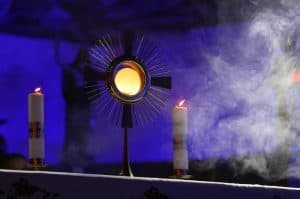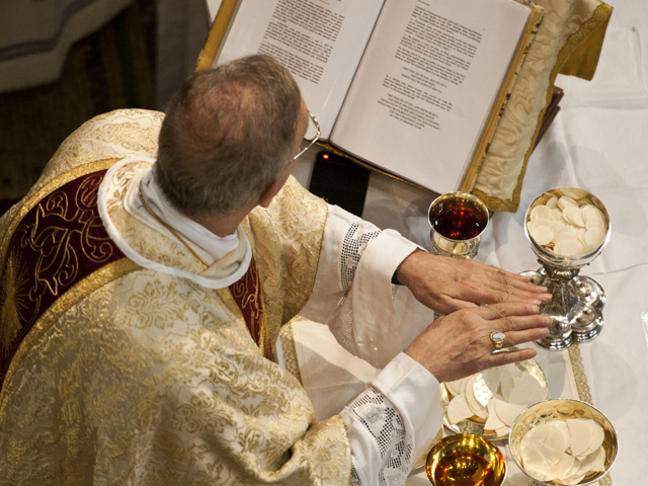…they cast down their crowns before the throne, singing, “Worthy are You, our Lord and God, to receive glory and honor and power, for You created all things, and by your will they existed and were created.” (Rev 4:10-11, RSVCE 2nd)
Imagine that you’re in a huge room that is surrounded by a series of free-standing pillars, every column being of different height and quality. Some shorter, some taller, one shortest, one tallest; a least, and a greatest. Let’s say that there is one greatest column decked out in gold, marble, jewels, ornate engravings, etc. All the other pillars are not as nice as this one. Now imagine everything and every aspect of your life, from your relationships to your material goods, jobs, hobbies, memories, favorite books, games, clothes, even aspects of your inner life, everything. Put absolutely everything you can think of concerning yourself on a specific column, knowing that you can only put only one aspect upon the greatest column you have. Whatever it is, the object or person you put on that greatest column is that which you worship, knowingly or unknowingly.
Every person has something sitting on that greatest column of theirs. Doesn’t matter if they’re religious, atheist, or indifferent. Every person, yourself included, gives their highest honor to something, and that something is their god, and the object of their adoration, meaning their deepest and most sacred expression of their most ardent desire.
Now, for the Catholic, the only one worthy of sitting on that greatest column of ours is God; Father, Son, and Holy Spirit. By our free will, we are in control of who or what sits upon that greatest column, and though for everyone it should be God, sometimes (or often) it is not. This is what happens when we choose a lesser good than God as our highest good, and thus fall into false worship.
What happens, then, if we truly let God be in His proper place in our lives, being the only one to whom we give our latria (our supreme adoration)? The answer, in short, is the wonderous effect of being perfectly ordered to what and who we are meant to be. Saints.
The story of Cain and Abel offers us an example of what adoration is, and what it means for us and for God.
Now Abel was a keeper of sheep, and Cain a tiller of the ground. In the course of time Cain brought to the Lord an offering of the fruit of the ground, and Abel brought some of the firstlings of his flock and of their fat portions. And the Lord had regard for Abel and his offering, but for Cain and his offering he had no regard. So Cain was very angry, and his countenance fell. The Lord said to Cain, “Why are you angry, and why is your countenance fallen? If you do well, will you not be accepted? And if you do not do well, sin is lurking at the door; its desire is for you, but you must master it.” (Gen 4:2-7).
Cain and Abel were both doing the same act, offering a sacrifice of adoration to God. Indeed, adoration is actually a type of sacrifice anyone can give, and it is a priestly act. So why was Abel’s offering pleasing to God, but Cain’s was not? God’s dialogue offer’s an insight. When He says, “If you do well, will you not be accepted? And if you do not do well, sin is lurking at the door…” The writer of the letter to the Hebrews adds, “By faith Abel offered to God a more acceptable sacrifice than Cain, through which he received approval as righteous, God bearing witness by accepting his gifts; he died, but through his faith he is still speaking.” (Heb 11:4) Cain’s sacrifice was not done well. There was something lacking in it, but what? Besides the quality of his fruits, it was the quality of his heart, his intention.
St. Irenaeus of Lyons comments, “For at the beginning God had respect to the gifts of Abel, because he offered with single-mindedness and righteousness; but He had no respect unto the offering of Cain, because his heart was divided with envy and malice.”[1] This envy and malice culminating in the act of killing Abel.
So, what are we to say of ourselves? Are we worshipping as God would want us to worship Him, as Jesus would want us to worship Him?[2]
Let’s return to the column analogy. What exactly happens when we place God on our greatest pillar, our singular place of worship and adoration? It is when we give God this place in our lives that we may be able to say, “Thy will be done.” (Mt 6:10), and then do it. The perfection of the Christian life, and the only route to sanctity, is in the radical life choice of renouncing ones’ own will in order to do the will of God alone. God’s will in everything that we do and speak. It’s Christ in every aspect of our lives; moral, physical, spiritual, and vocational. It is from this place of worship that we become disciples, children, saints of God. Unlike Cain, who adored with a divided heart, we must strive to be like Abel, who gave his all to the adoration of his Lord. Hence, Christ’s voice in the Imitation of Christ speaks, “My child, you will never be perfectly free unless you completely renounce self, for all who seek their own interest and who love themselves (inordinately) are bound in fetters.”[3]
Now this renunciation is not to make us mindless, or less free. In fact, we were made for the glory of God, and to glorify God by our very being is our end.[4] Jesus came that we, “may have life and have it abundantly!” (John 10:10). Fully alive, fully free, fully sanctified in Him. Any ambivalence in this is simply our distrust in God.
Now, what is the practical in all this? How can we begin to adore God? The Catholic Church’s gift of Eucharistic Adoration gives us a unique opportunity to learn.
Jesus, the second person of the Trinity, gave us His presence in the Holy Eucharist.[5] If we wish to learn how to love Jesus, we must sit by Jesus as Mary[6] did and learn from the Master. It is in Eucharistic adoration that Christ is literally put upon the column of the monstrance and waits there for your company. Why should we not go to Him who says to us, “Take my yoke upon you, and learn from me; for I am gentle and lowly in heart, and you will find rest for your souls.” (Mt 11:29).
Even if you struggle with believing that Jesus is the Eucharist, go, and ask if He is truly there. He will let you know that He is. Ask for the grace to adore Him who first loved you into being and let Him be your king. Everything else will then fall into place thereafter
By: Brother Angelo Marie final professed member of the Knights of the Holy Eucharist
[1] (Against Her. 4.18.3 ANF vol. 1)
[2] Lk 22:14-23. Catechism of the Catholic Church: 1384.
[3] Thomas a’ Kempis, Imitation of Christ, Book III, Ch. 32.
[4] CCC. 362, 2567.
[5] CCC. 1333.
[6] Lk 10:38-42.




